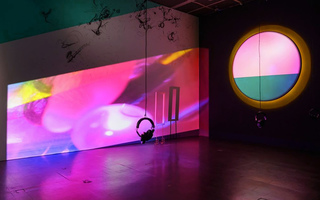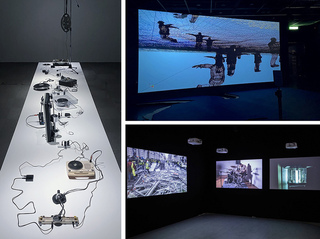

The exhibition in this file is divided into two group exhibitions, "Sound Meridians" and "Liquid Love". The two group exhibitions have their own themes, but there are subtle similarities between the two, presenting a reflection of current society and history. The two sub-topics of the exhibition are located on the first and second floors of the MoCA Taipei, respectively. The first floor is "Sound Meridians", which invites curators from four different regions in Asia-Taiwan, the Philippines, Singapore and Malaysia. Jointly curated by curator and artists, the theme is the specific sound cultural context and creation of the country, the content is different but echoes each other, and the Southeast Asian cultural context is an exhibition that combines audio-visual documents and research-based art works; The second floor exhibition area is the "Liquid Love" international joint exhibition. The exhibition aims to explore how the telecommunications society, dominated by the combination of financial capital and technology, is changing the lives of modern people under the shape and dominance of high-end telecommunications technology.
About "Sound Meridians- Cultural Counter-mapping though Sound: Taiwan, the Philippines, Singapore and Malaysia"
The title "Sound Meridians" is inspired by the concept of traditional Chinese medicine meridian-the belief that signs of human life are maintained through the movement of energy in the body in the "meridian", although Western anatomy can’t proves the existence of meridians, but there is a verifiable truth in Asian empiricism. The theme of the "Sound Meridians" project is to use this experience of the body as an image metaphor: how the culture of different parts of the world spreads and flows through sound, and even forms a dynamic and communicative public field, and in this, the sound culture How can it be used as the medium and raw material of historical topology to reflect the special historical and cultural features of a place?
The "Sound Meridians" exhibition is divided into four sections. The Taiwan section features Rainy Night Flowers and the Evolution of the Sound Apparatus in Taiwan, curated by Jeph Lo. It includes three parts: the “Talking Drums Radio" project and Taiwan's sound machines historical chronology, and artist Chao-Ming Teng’s ongoing work After All These Years . By jointly describing the process of the relationship between sound technology and the evolution of people's times.
Part of the Philippines invited scholar Dayang Yraola to present her project Taginting, A Resonant Community of Sound Practice, which presents the historical research of modern experimental sound in the Philippines with images and audio-visual files.The Singapore section foregrounds Melantun Records Pop-up: Electronic Dreams of Tsao Chieh, curated by musician Chee-Wai Yuen. Singaporean artist Ujikaji is invited to represent his work Melantun Records, which introduces the oeuvre of electronic musician Tsao Chieh, otherwise long since consigned to oblivion.The Malaysia section highlights Silver Noise: Sound Circuits of Peninsula Malaysia in Parts, on Exile, curated by artist Sow-Yee Au, showcasing the emergence, rheology, and different versions of Malaysian national anthem.
About "Liquid Love"
The title of the exhibition "Liquid Love" is derived from the book by Polish sociologist Zugmunt Bauman. Bauman’s lifelong analysis and research is aimed at today’s extreme, large amounts of financial capital, information data, and various Big data and algorithms, and the connotation of life shaped and dominated by high-end telecommunications technology. Bowman collectively referred to these qualities as "liquid modernity." The exhibition uses Bauman's "liquidity" to explore the new relationship between people and the world living in the Internet society.
The international joint exhibition "Liquid Love" curated by the curator Amy Cheng invites works of seven domestic and foreign artists to participate: Hassan Khan (Egypt), dj sniff (Takuro Mizuta Lippit) (Japan), Hito Steyerl (Germany), Hao Ni (Taiwan), Yu-Chen Wang (Taiwan/UK), Chi-Yu Wu (Taiwan) and Chung-Han Yao (Taiwan). Egyptian artist Hassan Khan’s work The Infinite Hip-Hop Song uses an algorithm to "create" hip-hop songs that are continuously generated automatically, like a self "organism" that grows and continues. Japanese artist dj sniff (Takuro Mizuta Lippit) in his work Drinking from the Spring of Liquid Love, collected songs with the title “Liquid Love” from a large volume of online information. The artist remixes these songs into a “new work,” and re-played through various modified sound objects. German artist Hito Steyerl’s work Liquidity Inc. creates an "immersive" environment for the audience, interpreting people's sense of survival in the liquid world in the face of the unstable and uncertain future and the way of personal survival through images. Chung-Han Yao’s work Feel the Space attempts to explore the parallel state of space and time between the real world and cyberspace. It creates overlaps and dislocations in reality and cyberspace at the same time, and allows the audience to travel between two different worlds through changes in listening methods. Structure Study VI by Hao Ni is a six-channel synchronized audio-visual work. It presents like a symphony in the way of "composition", allowing viewers to experience the speed and impact brought by the massive flow of images in the Internet world. Yu-Chen Wang’s multimedia installation If there is a place I haven’t been to through the scientific thinking and industrial Observation and understanding of development, interpreting in an imaginative way, in order to talk to memory, history, and different people and things. Chi-Yu Wu’s work The LED Future replaces the light created by God with imaginary LEDs and becomes the shape of memory and consciousness Reflecting on the current human history and the development of civilization.
In the “liquid modern world”, people enjoy the benefits and sense of speed brought about by technological development, pursue speed and change, emphasize ease of movement and maintain lightness. Although the virtual world has expanded and the boundary with reality has become increasingly blurred, we are experiencing a "relationship revolution" that is different from the past. At the same time, both physically and mentally, we need to re-adapt to the constantly changing conditions. In today's era, the relationship between individuals and groups has become fluid, liquid, transient and unstable. People desire to "connect" and want to tighten their relationship, but they must be loose at any time. freedom of". This exhibition uses art to treat technical creation as a new mode of communication between individuals, to reflect on the new relationship between people in the liquid world, and to try to imagine the future of society. The exhibition encourages viewers to travel within the space-time boundaries constructed by the works and freely enter this "multi-node" and "synchronic" reading context.
This exhibition is planned by The Cube Project Space and co-hosted by MoCA Taipei and The Cube Project Space. The curatorial project titled "Liquid Love" is composed of two group exhibitions "Sound Meridian" and "Liquid Love". The exhibition period is from November 14, 2020 to January 24, 2021.

